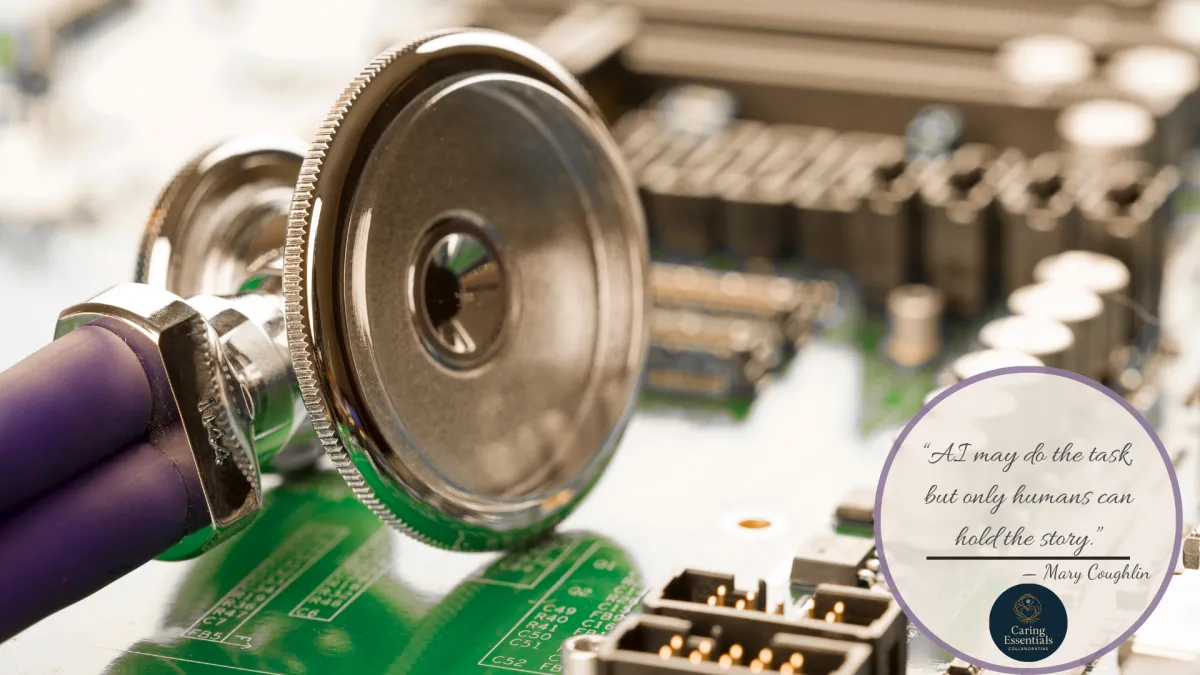
Will AI Replace Primary Care? A Trauma-Informed Take on the Future of Medicine
“AI may do the task, but only humans can hold the story.” — Mary Coughlin
Will AI Replace Primary Care? A Trauma-Informed Take on the Future of Medicine
AI Is Already Changing Primary Care
1. Diagnostics & Decision Support
3. Proactive, Personalized Monitoring
So Will We Need Fewer Doctors?
YES — For Routine, Algorithmic Care:
BUT NO — Because AI Can’t Replace Human Healing:
The Rise of a New Kind of Healer
We’re standing on the edge of a massive shift in healthcare.
Artificial Intelligence is no longer a someday concept—it’s here, and it’s already reshaping how we deliver care. Across hospitals and clinics, algorithms are being trained to detect disease, answer patient questions, and streamline workflows.
But with all this change comes a question I hear more and more often:
Will we still need doctors in the age of AI?
More specifically: Is primary care about to be replaced?
The short answer?
Yes—and no.
AI Is Already Changing Primary Care
Primary care is often the first place people enter the healthcare system—and it’s where we’re seeing some of the most immediate AI integration. Here’s how:
1. Diagnostics & Decision Support
AI excels at pattern recognition. From detecting skin cancer on photos to flagging abnormal labs in real time, algorithms are helping clinicians make faster, more accurate decisions—sometimes better than human counterparts. And they never get tired.
2. Administrative Relief
The paperwork burden in healthcare is staggering. AI can now transcribe notes, submit billing codes, and even automate prior authorizations. This doesn’t just save time—it prevents burnout.
3. Proactive, Personalized Monitoring
Remote monitoring tools are feeding real-time data into AI systems that can alert providers (and patients) before a crisis occurs. Think of it as a 24/7 early warning system, offering a new kind of preventive care.
4. Virtual First Encounters
Chatbots and AI assistants are already managing basic questions, triaging symptoms, and recommending next steps. They’re faster than a phone call and available anytime.
So Will We Need Fewer Doctors?
It depends on how we define the role of a doctor.
YES — For Routine, Algorithmic Care:
AI will manage more low-acuity encounters.
Fewer in-person visits may be needed for basic issues.
A single clinician may safely oversee a larger panel of patients with AI’s support.
BUT NO — Because AI Can’t Replace Human Healing:
AI can’t build trust.
It can’t hold silence for someone’s grief.
It can’t read between the lines of a trauma story—or choose when not to speak.
It doesn’t understand lived experience, power, or presence.
The Rise of a New Kind of Healer
The clinicians of tomorrow will need:
Fluency in data and systems thinking
Cultural humility and trauma-informed perspective
Ethical discernment in the face of powerful algorithms
And above all, relational presence
In this new world, the physician’s role won’t disappear. It will evolve—from gatekeeper of knowledge to interpreter of wisdom, from diagnostician to deep listener and advocate.
A Paradox and a Truth
The more we automate the tasks of healthcare, the more we will need humans for the care.
AI may do the job, but only humans can hold the story.
In this way, AI doesn’t diminish the clinician’s role.
It clarifies it.
And that might be the gift we didn’t see coming.
Coming Next: What About Nurses?
In my next post, I’ll explore the future of nursing in an AI-powered system. Spoiler alert: Nurses aren’t going anywhere—but they may finally be seen for the powerful, intuitive healers they’ve always been.
Reflection Prompt
What does care mean to you in the age of machines?
Where do you see yourself in the future of healing?
Let’s Stay in Conversation
If you’re a clinician, educator, or leader grappling with these changes, you’re not alone.
Join me in the TIP 2.0 Certificate Program, where we explore the science, soul, and skills of trauma-informed care in the 21st century and beyond.
Because caring will never be obsolete.
But it will be reimagined.
Take care and care well,
Mary
